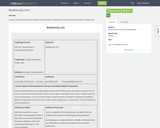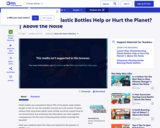
2-week unit with activities for Biodiversity Unit within Introduction to Environmental Studies college class.
- Subject:
- Environmental Literacy and Sustainability
- Material Type:
- Module
- Author:
- Jan Wellik
- Date Added:
- 06/23/2020

2-week unit with activities for Biodiversity Unit within Introduction to Environmental Studies college class.

This unit will use a variety of resources to show issues related to Indigenous lands, explain some of the Red Cliff Band of Lake Superior Chippewas history and discuss how the Red Cliff Band of Lake Superior Chippewas is going about reclaiming tribal traditional lands, and how Indigenous people have a traditional, cultural, and spiritual connection with the lands that they reside on.This unit will use a podcast, youtube video, news articles, and traditional storytelling in hopes the students will be able to see the importance of gaining knowledge. After this unit they will learn about the Power of Indigenous Knowledge!

This powerpoint presentation was provided by Cathy Techtmann, a Professor of Community Resource Development and an Environmental Outreach Specialist for the University of Wisconsin-Division of Extension to gain an understanding of public perspectives on climate issues. Cathy lives and works in the homeland of the Lake Superior Ojibwe people. This presentation was part of the 2023 Fall Climate Education Series. Portions of this presentation could be used to introduce learners to place-based climate impacts.

Plastic bottles are everywhere! About 70% of the plastic water bottles bought in the U.S. are not recycled, and end up in the oceans. It seems obvious that using fewer plastic water bottles would be a good thing for our environment, but sometimes the alternatives can have negative consequences. Do the costs of banning plastic bottles outweigh the benefits?